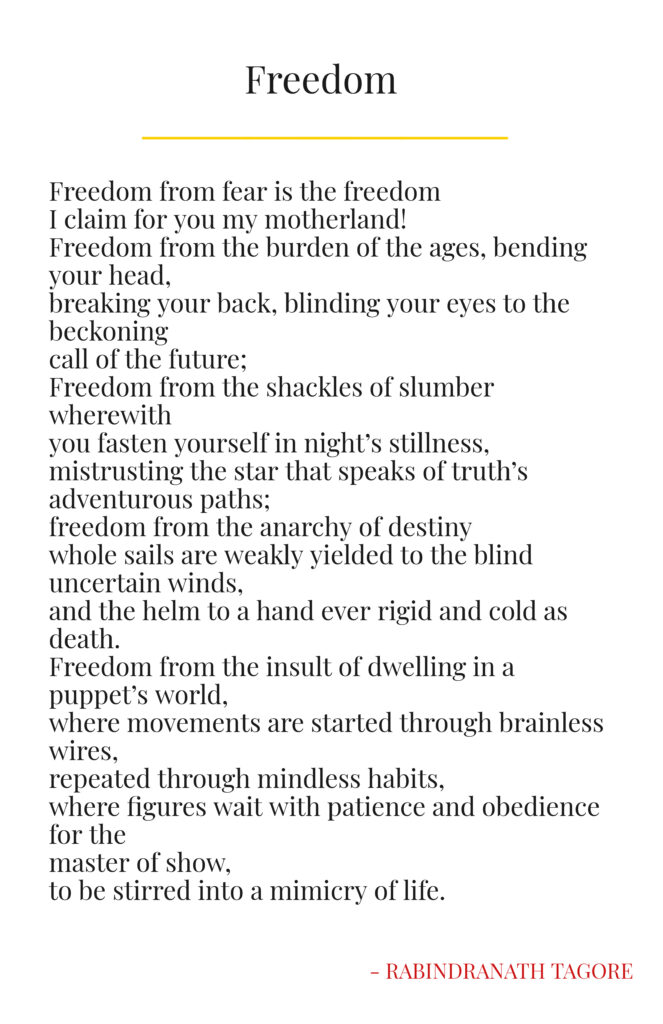Rabindranath Tagore (1861-1941)
- Tagore was one of the important figures in Indian literature.
- He was born in a highly educated aristocratic family.
- He did most of his early education at home.
- At eight, he started writing poems.
- He was sent by his father to England to train him as a barrister.
- But he could not continue his education there.
- He came back to India, he took part in the national freedom struggle.
- In 1901, he moved to Shantiniketan and spent almost the rest of his life there.
- He was the first Asian and non-European to receive the Nobel Prize for literature.
- He received Nobel Prize for Gitanjali in 1913. He was the founder of Visva-Bharati University.
- He wrote two national anthems- for India and Bangladesh.
- He died on 7 August 1841.
- Tagore is known as “the Bard of Bengal”.
- He gained popularity across the world through the English translations of his works done either by himself or others.
- Though he contributed to different genres of literature, Tagore was primarily a poet.
Collections of poetry.
- Manasi (1890),
- Sonar Tari (1894),
- Gitanjali (1912)
- Gitanjali is a collection of 103 untitled poems. These poems are originally written the Bengali Language. Later, he himself translated into English by the poet himself.
- Gitimalya (1914)
- Balaka (1916).
Introduction.
Freedom is one of the patriotic poems written by Tegore. He wanted to get freedom for India from the hands of Britishers. He wrote this poem in the context of the Indian freedom struggle. According to Tegore freedom is not merely political in nature, but liberation from all kinds of oppressions and irrational conventions. For him, real freedom means liberation from all kinds of oppression like religious, political, moral, and intellectual oppression. Rabindranath Tagore wanted to unite all Indians against oppressive dogmas and conventions and breaks all barriers created by caste and creed.

Freedom summary.
In the poem, Tagore talks about four types of freedom, which are necessary for the well-being of India. The first one is freedom from fear, the second one is freedom from the passive state of our homeland, the third one is freedom from the anarchy of destiny, and the last one is freedom from the insulting world of puppets.
In the first two lines, Tagore says that fear is the most dangerous thing all Indians have to get rid of that. Real freedom is freedom from fear. Fear always limits freedom. In the second line, Tagore uses the phrase, motherland to signify India. These two lines express his desire to get India freedom from fear.
The Third line expresses his second wish that helps Indian to have a bright future. He says that all Indians have to get freedom from all senseless, illogical, orthodox beliefs and traditions. In front of British colonial rule, Indian are inactive. We considered Britishers as ideal and they came to India to educate and civilize us. We considered them masters and obeyed everything that was imposed on us without any resistance. Tagore wanted to break such attitude toward Britishers and start a new era where Indians can enjoy their freedom. Tegore did not want to bend our heads in front of British masters. We have our own traditions and conventions. No need to follow what the Britishers teach us.
In the next two lines, Tagore says that we are inactive under British rule. All Indians have to awaken from their sleeping. This is ample time to stand for our freedom. Tegore further says that never mistress anyone who leads you through the path of truth.
Another thing Tagore says is that we have to get freedom from the anarchy of destiny. It is meaningless to criticize everything for destiny. Under the British Raj, Indians had to lead meaningless lives. Therefore, Tagore says that we have to lead a meaningful life by fixing our own aims and objectives. Britishers came to India for their own needs and purposes. We are not sailors who sail based on the blind uncertain wind.
Another thing Tagore says is that we Indians should get freedom from the insulting world of puppets. Tegore compares Indian life with a puppet show, where very things are controlled by the master. Same way everything is being controlled by the Britishers. We just obey the instructions given by British administrators. In a puppet show, the movement of all puppets is decided by the brainless wires held in the hands of the puppet master. All puppets look more obedient and act or move only based on the movement of wires held in the fingers of the master. This is a kind of mimicry of life. Same way, the Indian administration, and culture are being controlled by British masters. We were forced to lead our life according to their wishes.
Structure of the poem Freedom
This is a poem written in free verse. Freeverse means the poem doesn’t follow any rhyme scheme or pattern. The poem consists of seventeen lines and there is no stanza division. the whole poem is presented in a single stanza.
Literary Devices or Poetic Devices.
Throughout the poem, Tagore uses different figures of speech or literary devices. Following are some of the literary devices used in the poem, Freedom.
ALLITERATION: Alliteration is the repetition of the initial consonant sounds of words that are close to each other. For example: “shackles of slumber”, “freedom from fear”, etc. Here in the example, “shackles of slumber” the consonant sound /s/ is repeated two times in nearby words. In the phrase, “freedom from fear”, the sound /f/repeated three times in nearby words. Such a kind of reputation is known as alliteration.
METAPHOR: The metaphor is another figure of speech or literary device that describe one object or action, literally that cannot be true but that helps to explain another idea. In the poem, Tagore uses metaphors in the different lines like, “shackles of slumber”, “burden of ages”, etc.
This is one of the best poems written by Tagore. In the poem, Tagore suggests kind freedom for India. For Tagore, freedom is not just political in nature, that is a liberation from all kinds of oppressions and exploitations based on religions, caste, class, creed, politics, intellectuals, and morality. This is the poem written during the days of freedom struggle. He demands Indians to unite and fight against the Britishers and the illogical practices in our tradition.
